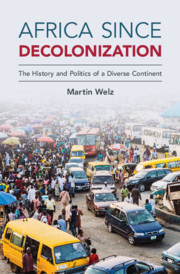Book contents
- Africa since Decolonization
- Africa since Decolonization
- Copyright page
- Dedication
- Contents
- Illustrations
- Acknowledgments
- Prologue
- 1 From the Golden Age to Conquest and Colonization
- 2 Decolonization and Liberation
- 3 Decolonization’s Legacies
- 4 External Influences
- 5 Africa’s Economy, 1960–2000
- 6 Economy, Socioeconomic Development, and Development Cooperation
- 7 States, Political Systems, and Actors
- 8 Intra-African Cooperation and Integration
- 9 Political Crises
- 10 Large-Scale Conflicts
- 11 International Conflict Management
- 12 African Actors’ Role in International Politics
- Epilogue
- Notes
- Index
4 - External Influences
Published online by Cambridge University Press: 07 January 2021
- Africa since Decolonization
- Africa since Decolonization
- Copyright page
- Dedication
- Contents
- Illustrations
- Acknowledgments
- Prologue
- 1 From the Golden Age to Conquest and Colonization
- 2 Decolonization and Liberation
- 3 Decolonization’s Legacies
- 4 External Influences
- 5 Africa’s Economy, 1960–2000
- 6 Economy, Socioeconomic Development, and Development Cooperation
- 7 States, Political Systems, and Actors
- 8 Intra-African Cooperation and Integration
- 9 Political Crises
- 10 Large-Scale Conflicts
- 11 International Conflict Management
- 12 African Actors’ Role in International Politics
- Epilogue
- Notes
- Index
Summary
African states have been and are subject to external interference. During the Cold War, the USA and the Soviet Union competed for influence, as did China and France. After the Cold War ended, a decade commenced in which there was fewer external influence but the promotion of a liberal-cosmopolitan order. The rise of China in Africa (and beyond), beginning roughly in 2000 as well as the 9/11 and other terrorist attacks ended that decade of relative calm. A phase of heightened interest in Africa began, particularly in the areas of security, migration, and economic policy, often labelled the “New Scramble for Africa” that continues to the present day.
Keywords
- Type
- Chapter
- Information
- Africa since DecolonizationThe History and Politics of a Diverse Continent, pp. 68 - 89Publisher: Cambridge University PressPrint publication year: 2021

